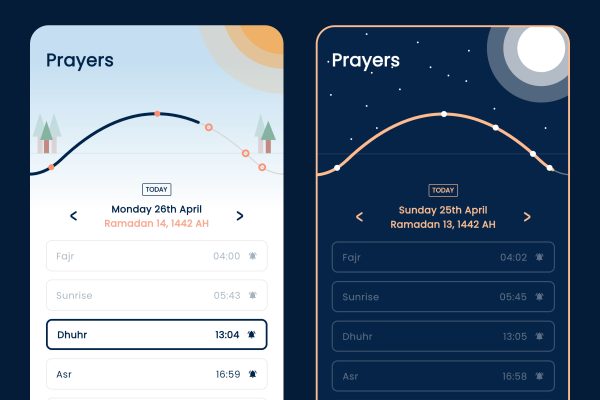“The main thing we wanted to do is create an improved prayer app alternative that didn’t have ads, didn’t share data, and actually felt good to use.”
“The main thing we wanted to do is create an improved prayer app alternative that didn’t have ads, didn’t share data, and actually felt good to use.”
There’s a brand new app for Muslims called Pillars which has created a buzz in the Muslim community, particularly on Twitter. Pillars is an ad-free app that helps Muslims know when to pray and in which direction, with a focus on privacy.
As many Muslims continue to stay sceptical and wary of apps after reports of Muslim Pro selling the private information of its users, it remains even more important to understand and appreciate apps like Pillars that focuses on ensuring a secure and safe environment for Muslims.
We sat down with the founders of the Pillars app, Tariq Jamal and Abdul-Rahman Abbas, to discuss their journey and what they hope to see in the future for the wider Muslim community!
TMV: What is your academic or professional background, and did you ever imagine creating a Muslim prayer app? Was this a spontaneous decision or was it planned?
Tariq: I’m currently studying for a master’s in Mathematical Computation at University College London. My app development journey started last year when I began working on a health tech app (Eden), which is currently being used as part of a national healthcare trial funded by the Economic and Social Research Council. While learning app development, I did think that it would be cool to develop a small app for Muslims in some capacity as a passion side-project. However, this didn’t come to fruition until a VICE article was published in November 2020 claiming that certain Islamic apps user data was being sold to third parties and, in turn, giving the U.S. Military access to this data.
Abdul-Rahman and I, along with some of our friends, were in a WhatsApp group chat together in which we were discussing the article, and how betrayed we felt. It wasn’t long after that conversation that the two of us agreed to begin working on an alternative for Muslims, which would address the key issues with most other prayer apps on the market. It would be an ad-free, privacy-focused app made by Muslims!
Unfortunately, while we initially thought it would be a one-week project, both of us had other commitments to attend to and so we delayed working on the app until we were both free. In March, we both agreed to pick up work on the app again, and while it took longer than one week, we had a goal in mind to release the app before the end of Ramadan, which we managed to do, while also gathering interest on Twitter throughout the process.
Abdul-Rahman: My name is Abdul-Rahman and I’m a final year medical student at University College London. My father has been involved with multiple businesses over his lifetime and my exposure to this I think triggered an entrepreneurial do-it-yourself mindset. Seeing the impact from all the interesting tech startups coming out of the US and Europe I decided to get involved in design (UX/UI) and web development in my free time, particularly during my third year of university whilst I was studying for my Neuroscience BSc. Using those skills I built and launched a free online platform to help widen access to Medicine called Medmentor (medmentor.co.uk). Alhamdulillah, it’s now used by over 4,500 sixth formers every month.
Building a Muslim prayer app was absolutely not something I imagined doing. There are literally thousands of prayer apps on the app and play store and if you asked me to build one a few years ago I’d have said it’s a really crowded space (despite the options being less than ideal – ads and poor UI) and that those apps more-or-less do the job. Besides, time is limited and there are many other problems that we could be solving, right? If it weren’t for the breakthrough report by VICE in November 2020 which revealed a huge data privacy issue with the most popular Muslim prayer app, an app that both Tariq and I were using, we probably would not have felt the imperative to build Pillars. That was the real trigger that made us think “let’s do it”.
However, even then our goal wasn’t to do anything drastic.
The main thing we wanted to do is create an improved prayer app alternative that didn’t have ads, didn’t share data, and actually felt good to use.
In fact, the plan was to build this in a week and then open-source it (i.e. share all the code with the community) so that other Muslims could build upon this. We just wanted to utilise our skills, build a better alternative and gift it to the Muslim community. It was only after we began sharing designs of the app-to-be that we got a lot of interest and requests for features that made us realise how big the opportunity for impact was.
Many Muslims are wary of trusting apps due to reports of personal data being sold to the US government. How can Muslims trust your app?
Tariq and Abdul-Rahman: We absolutely understand why Muslims are wary of trusting apps. In fact, in the aftermath of the VICE report, many Muslims were deleting all sorts of other (Muslim) apps regardless of whether they’d been implicated by the report or not. Some people even told us they had reverted to PDFs and googling prayer times as a safer alternative. We get this and we knew we’d have to address the significant but well-justified skepticism in the community as a result of this report. In fact, even after our launch, those individuals who didn’t know us personally or hadn’t been following our journey on Twitter did occasionally express concerns that we would turn out to be the same.
To address this we decided to do two things: share all our work with the community along the way and put our identities out there. At the end of the day, we had to rebuild trust with the community and what better way to do this than to show everyone exactly who was behind the app and engage with them regularly.
We built our app in public showing every single step of the building process.
We even got the community involved in a number of ways. For example, we’d often share polls on our Twitter account to find out people’s design preferences and even chose our name, Pillars, in this way. The app was community-led and we wanted all our users to feel that they are truly part of the team, a third co-founder so to speak!
Our data privacy is indicated clearly on the app store and a link to our privacy policy can be found via our website, the app and on the app store (+ here). We left out all the jargon that you commonly find in privacy policies and kept it as simple and short as possible for concerned potential users to read and understand what we’re about. On the Apple app store, you can see exactly how we use data on our prayer app product details page.

Tell us about the specific features of your app – what else does it provide besides the Qibla direction?
As it stands, the Pillars app does all the core things you’d expect a prayer app to do, with a few significant additional benefits of course. We completely removed all types of ads – we didn’t feel ads were befitting for a prayer app and there are also data implications involved too that didn’t fit the spirit of our privacy-focused approach. We also wanted users to have an exceptional experience when using the app.
One of the first things a Muslim will do before they pray, often before they’ve even done wudu (ablution), is check the prayer time. Knowing that opening our app was potentially going to be one of the first things a Muslim does in the process of getting ready for prayer we wanted to ensure that we were delivering the perfect user experience that suited this scenario.
We made the app extremely simple to use and designed it with a clean, modern, and minimalist design.
To cater to those who quickly want to know the prayer time we also made a free Pillars widget so you could get a quick snapshot of all the prayer times directly on your home screen.
Whilst we have prayer time options that cover a significant number of countries across the world, our app will soon allow people to adjust their prayer times according to the angles of their methodology and adjust times to fit their local mosque’s timetable too. This will mean Pillars will be ready for use by every Muslim regardless of their methodology and ensure our app is a viable alternative for every Muslim across the world. Once this goal has been achieved, we will move our focus to the next big problem: attempting to address the spiritual crisis Muslims find themselves in.
We want Pillars to be a tool that empowers Muslims to build their spiritual selves.
Only by addressing this can Muslims effectively address the wider issues that our ummah faces. Obviously, as a prayer app, the natural place to start is the salah (prayer)! We’re currently working on developing methods to help Muslims pray and pray on time. One example feature that is coming soon inshaAllah is a prayer tracker but we’ve got many more exciting features planned.
Definitely watch this space!
Do you feel that by creating this app here in London, you’re catering specifically towards Western Muslims? Or is this an app for a global community?
Our app is used globally with over 50% of our users coming from outside the UK. The app offers a range of calculation methods that includes (but is not limited to) Pakistan, Kuwait, Egypt, and Singapore. Many of course more are coming soon (e.g. Turkey) and we endeavour to ensure that every Muslim across the world can use the Pillars app.
Our experience as Muslims who grew up and lived in the UK will obviously shape the way we view the world and influence the type of problems we feel need addressing. However, given the globalised world, we now live in we think it’s safe to say that cultures have merged significantly over the past 100 years or so and differences between cultures are becoming less significant with each decade. Therefore, a lot of the problems we seek to solve in the future are problems that impact Muslims across the world. This includes the aforementioned spiritual crisis Muslims face. We both see this when we visit back home too. Therefore, we see no reason why Muslims worldwide couldn’t use and benefit from our current prayer app and the features we plan to bring.
However, we want to ensure we leave no community behind. Therefore, going forward we will try to do at least two things to ensure our app is as accessible as possible to the global audience. For example, we will begin publishing our app in different languages very soon starting with Arabic. We will also ensure any subscription prices are localised – i.e. prices are set according to what is reasonable for people living in that country.
For example, by adjusting subscription prices according to the local living wage. We haven’t worked out the specifics but this is our aim to make sure all future subscriptions are fairly priced and accessible to all. It’s worth noting that our current app and features are completely free and will remain so forever. However, this is part of our commitment to remain sustainable and fair.
Why do you think it’s so easy for many of us to (unfortunately) slack when it comes to prayer? Why do you think it’s important for us to have an app like yours on our phones?
The reasons are multifactorial. For example, the environment is a big factor. A person might try to squeeze prayer into their busy schedules rather than build their day around prayer. For some that might not even be possible depending on their type of work. We’re also surrounded by a superficial and materialistic society and this has really messed up a lot of our priorities. At the end of the day, all Muslims know that praying is a compulsory part of our faith. Therefore, if we do choose to do something else over praying are we not essentially attributing more importance to that worldly activity over the akhira.
We must remember Allah’s commandments and the virtues of prayer. Unfortunately, the vast majority of Muslims won’t have experienced the benefit of prayer either as it requires effort, persistence and focus. There’s wisdom behind why the Prophet (pbuh) said that reminder benefits the Muslim.
Therefore, even if a Muslim isn’t praying every day our app and widget provides them with a constant reminder that they can turn back to Allah at any moment.
Allah’s mercy is beyond our comprehension. In fact, they’re invited to five times a day with our notifications and/or the athan. These notifications can help break up the day and remind you about your real purpose on earth. Unfortunately, I don’t think we reflect on that as much as we should do. We’re all too busy in the rat race we’ve built for ourselves!
Alhamdullilah, we’ve already received messages and reviews of Muslims who’ve explicitly said that the Pillars app has helped them with staying on top of their salah. I think one aspect of this is creating a nice experience for Muslims. However, we’re also conscious of not anaesthetising the deen. Part of our mission is to focus on the inward spiritual side of things, and this is often lost when we focus too much on the outward. We’ve tried to do that by keeping the app simple and distraction-free. On social media, we commonly see overemphasis placed on the outward aspects of the religion, despite our deen instructing us to seek both with equal balance.
For example, focus on the beauty of places we pray in, the way our thobe or abaya looks, the length of our beard etc. Looking nice and presentable is part of the sunnah but we’ve definitely become more materialistic in our approach and part of our mission is to empower Muslims with the tools to help them return to the inward aspects of the deen.
It’s also about ihsaan and disciplining the soul.
Why do we think it’s important for Muslims to use apps like ours on their phones right now? Without sounding too alarmist, at the end of the day, this is a matter of security. If you care about the welfare and safety of yourself and Muslims across the world then you need to begin prioritising privacy, more than other non-Muslims. Whilst everyone’s privacy is being threatened across the world the reality is Muslim community is usually target number one. The VICE report is an excellent example of that. Therefore, switching to a privacy-focused app like Pillars is a key step to ensure mass Muslim data isn’t being collected and shared. If you’re still unsure we invite you to do your own research and make a decision for yourself!
The other aspect is improving your prayer experience. If you want to open an app that doesn’t immediately show you inappropriate ads but instead gives you the information you need quickly, easily, and simply then Pillars is for you. Alhamdullilah positive feedback for the app has come from across the age ranges. Muslims young and old love the aesthetics and simplicity and we will keep both these priorities in mind for any future update insha’Allah.
What do you think the future holds for the merging of technology and how we practice our faith?
The content is the same. But delivery must change with the times.
Society and technology are advancing at an exponential rate. The next 5-10 years will see developments in technology that are more significant than the past 30 years. Yet the tools we use to educate Muslims and implement our faith into our busy daily lives are lagging behind, significantly. This may also be part of the reason why faith is being practiced less and less over time.
In fact, we see this issue across our history. Eventually, when we catch up with technological advancements we see a huge burst of improvement. For example, when a new medium, paper, was adopted from China (developed by Muslims) there was now new ‘technology’ that was cheaper, easier to store and transport than parchment and papyrus. This absolutely transformed the economics of book products resulting in a substantial increase in manuscript books on an unprecedented scale. This created a new book culture and libraries were assembled.
Arguably the bigger impact was that of the printing press that came later which allowed thousands of accurate copies of texts to be made. However, it’s worth noting that Muslims did not initially feel the need to adopt the printing press even though other cultures had moved ahead with it. This rejection probably resulted in a decline in the intellectual output of the Muslim world. Eventually, the Ottoman Empire recognised this and established its own printing press. We Muslims risk similar or more detrimental consequences by ignoring the technological revolution we’re going through right now.
Apps and websites are the new ‘paper’.
The content is the same but the medium of delivery changes with the times. In order to ensure our faith remains accessible and practiced among other ideas, we have to adapt to ensure we can deliver the same messages through new technological means.
At Pillars, we plan to take the techniques and tools that were traditionally used by Muslims and students of knowledge to discipline their souls and improve their spiritual selves and package them in an app that can be easily accessed by anyone anywhere and at any time. Think of it as an on-demand tool for self-development. We want to bring those benefits from small Muslim academic circles out into the public in a scalable manner so that up to 1.8 billion Muslims across the world can benefit inshaAllah.
To learn more about the Pillars App, click here!





